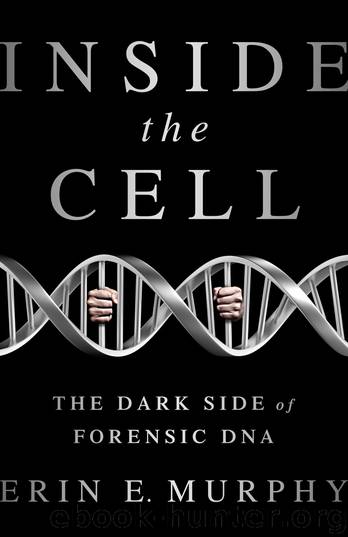Inside the Cell by Erin E. Murphy

Author:Erin E. Murphy
Language: eng
Format: epub
ISBN: 9781568584706
Publisher: Nation Books
Published: 2015-09-14T16:00:00+00:00
ARE THEY LEGAL?
Given the inequities, it stands to wonder whether familial searches are even constitutional. The answer turns out to be incredibly complex. No court has yet ruled on the legality of familial searching, although it implicates important constitutional questions. Although a challenge to familial search methods might raise a number of claims with varying likelihood of success,72 two particular rights protected in the Constitution seem most applicable to the practice.
The first is the Equal Protection Clause, which prohibits the state from intentional discrimination. At first glance, the most enticing approach would be to complain that familial search practices disparately impact certain racial minorities. But under current doctrine, that claim is least likely to prevail. Equal Protection requires proof of intentional discrimination, which would be hard to establish. Disparate impact alone—the fact that certain groups are more affected than others—does not provide grounds for relief.73
Rather, the stronger Equal Protection argument is one based upon general arbitrariness. That is, a formal practice and policy to focus suspicion on relatives of convicted persons arbitrarily singles out those persons.74 Again, however, this claim will likely fail. Under current doctrine, courts only invalidate arbitrary line-drawing if it is completely irrational,75 assuming the lines are not concertedly drawn on a suspect basis such as race or gender.76
Instead, the Fourth Amendment presents the most logical grounds on which to lodge a claim. The critical part of the familial search is the moment that the investigator checks the database for near misses, rather than exact matches, to the crime scene sample. But this, too, is saddled by two major doctrinal hurdles. First, typically the only people allowed to complain about a Fourth Amendment violation are those whose rights are directly affected. Suppose a thief steals an iPod and runs into a subway station. When he sees the police approaching, he slips the iPod into the knapsack of the person standing next to him. Unlawfully, the police grab the knapsack and search it, finding not only the iPod but drugs possessed by the knapsack owner. Although the knapsack owner could challenge the unlawful search, the thief cannot. The thief has no rights in the knapsack; just because something that incriminates him was found there does not give him the ability—or standing, to use the legal term—to challenge the police action.
Similarly, courts could find that the only individuals whose rights are affected by a database search are those of the people in the database, not their relatives. It is they who have the grounds to complain—not family members who may come under suspicion after the databased person is identified as a potential lead from a search. Yet constitutional challenges to the collection, databasing, and search of DNA from convicted offenders have almost uniformly been rejected.77 In the end, their complaint is attenuated from the actual harm, since it is the relative who falls under suspicion. Under this reasoning, the same authority that gives the state the ability to collect and database the DNA also allows that state to search it, or make inferences from it, as the state sees fit.
Download
This site does not store any files on its server. We only index and link to content provided by other sites. Please contact the content providers to delete copyright contents if any and email us, we'll remove relevant links or contents immediately.
| Anthropology | Archaeology |
| Philosophy | Politics & Government |
| Social Sciences | Sociology |
| Women's Studies |
The Secret History by Donna Tartt(19083)
The Social Justice Warrior Handbook by Lisa De Pasquale(12190)
Thirteen Reasons Why by Jay Asher(8907)
This Is How You Lose Her by Junot Diaz(6885)
Weapons of Math Destruction by Cathy O'Neil(6279)
Zero to One by Peter Thiel(5800)
Beartown by Fredrik Backman(5751)
The Myth of the Strong Leader by Archie Brown(5507)
The Fire Next Time by James Baldwin(5442)
How Democracies Die by Steven Levitsky & Daniel Ziblatt(5218)
Promise Me, Dad by Joe Biden(5153)
Stone's Rules by Roger Stone(5087)
A Higher Loyalty: Truth, Lies, and Leadership by James Comey(4959)
100 Deadly Skills by Clint Emerson(4924)
Rise and Kill First by Ronen Bergman(4788)
Secrecy World by Jake Bernstein(4751)
The David Icke Guide to the Global Conspiracy (and how to end it) by David Icke(4717)
The Farm by Tom Rob Smith(4507)
The Doomsday Machine by Daniel Ellsberg(4490)
